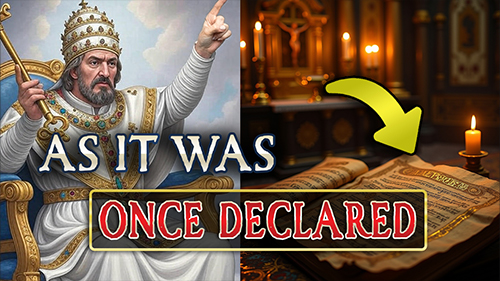| Recent Featured Videos and Articles | Eastern “Orthodoxy” Refuted | How To Avoid Sin | The Antichrist Identified! | What Fake Christians Get Wrong About Ephesians | Why So Many Can't Believe | “Magicians” Prove A Spiritual World Exists | Amazing Evidence For God | News Links |
| Vatican II “Catholic” Church Exposed | Steps To Convert | Outside The Church There Is No Salvation | E-Exchanges | The Holy Rosary | Padre Pio | Traditional Catholic Issues And Groups | Help Save Souls: Donate |  |









 " />
" /> " />
" /> " />
" /> " />
" /> " />
" />




Specific Catholic Teaching Against Protestant and Schismatic Sects
Back to the Athanasian Creed
The Catholic Church also teaches that those baptized persons who embrace heretical or schismatic sects will lose their souls. Jesus founded His Church upon St. Peter, as we saw already, and declared that whoever does not hear the Church be considered as the heathen and publican (Matthew 18:17). He also commanded His followers to observe “all things whatsoever” He has commanded (Matthew 28:20). The Eastern schismatic sects (such as the “Orthodox”) and the Protestant sects are breakoff movements that have separated from the Catholic Church. By separating themselves from the one Church of Christ, they leave the path of salvation and enter the path of perdition.
These sects obstinately and pertinaciously reject one or more of the truths that Christ clearly instituted, such as the Papacy (Matthew 16; John 21; etc.), Confession (John 20:23), the Eucharist (John 6:54), and other dogmas of the Catholic Faith. In order to be saved one must assent to all the things which the Catholic Church, based on Scripture and Tradition, has infallibly defined as dogmas of the Faith.
Below are just a few of the infallible dogmas of the Catholic Faith which are rejected by Protestants and (in the case of the Papacy) by the Eastern “Orthodox.” The Church “anathematizes” (a severe form of excommunication) all who obstinately assert the contrary to its dogmatic definitions.
Thus, a Protestant or an “Eastern Orthodox” who obstinately rejects these dogmatic teachings is anathematized and severed from the Church, outside of which there is no salvation. It’s quite interesting that, in issuing these dogmatic canons, the Church says: “If anyone shall say…. let him be anathema [anathema sit]” as opposed to “If anyone shall say… he is anathema [anathema est].” This qualification of “let him be” allows room for those Catholics who may be unaware of a particular dogma and would conform to the teaching of the canon as soon as it were presented to him. The person who is obstinate, however, and willfully contradicts the dogmatic teaching of the Church receives the full force of the automatic condemnation.
The point here is that if one is able to reject these dogmas and still be saved, then these infallible definitions and their accompanying anathemas have no meaning, value or force. But they do have meaning, value and force – they are infallible teachings protected by Jesus Christ. Thus, all who reject these dogmas are anathematized and on the road to damnation.
[1] New Advent Catholic Encyclopedia, newadvent.org, “Anathema.”
[2] The Papal Encyclicals, Vol. 3 (1903-1939), p. 242.
[3] Denzinger 883.
[4] Denzinger 913.
[5] Denzinger 910.
[6] Denzinger 810.
[7] Denzinger 1826-1827.
Sign up for our free e-mail list to see future vaticancatholic.com videos and articles.
Recent Content
^